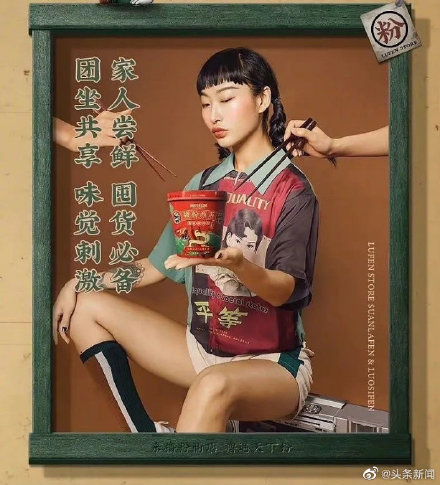Social media punishes accounts for misdeeds in discussions over Three Squirrels ad controversy

Advertisement by Chinese snack retailer Three Squirrels
The controversy surrounding an advertisement by Chinese snack retailer Three Squirrels, which was criticized for using a derogatory Asian stereotype, has not died down even after heated discussions continued for nearly a week on Chinese social media. Analysts said that more discussions of this kind will occur, as Chinese people are more aware of aesthetic values twisted and imposed on them by the West.
On Thursday, China's social media platform Sina Weibo announced that it was deleting illegal content from 28 accounts and banning them from posting for seven to 30 days as punishment for their improper deeds during the online discussions over the Three Squirrels controversy.
Since Sunday, Chinese netizens have lashed out at an advertisement by Three Squirrels that uses a model with slanted eyes for "humiliating China," saying that it uses an image that feeds into a stereotypical Western image of Chinese people. However, the model later responded to the backlash, saying those who equate slanted or small eyes with "insulting China" are discriminating against her appearance, sparking a fresh wave of debate.
The reason why the incident sparked such controversy is that it brings together several topics, including derogatory Asian stereotypes, discrimination against appearance, personal attacks and racism purposely incited by some forces. And with more people getting involved in the discussions, the focus of the incident has been blurred, Shen Yi, a professor from the School of International Relations and Public Affairs at Fudan University, told the Global Times.
Essentially, the debate over the incident is a challenge from Chinese people against those who believe they have the right to speak about aesthetic appreciation without realizing that their tastes have been tamed by the West, Shen noted.
During the nearly week-long discussions on the topic, netizens were divided into different groups, with some insisting that the ad reflects aesthetic diversity and the term "insulting China" has been too widely used to muzzle different voices on social media.
Others said the slanted eyes makeup is made to cater to the twisted Western concepts of beauty and takes a derogatory view of Chinese people, and some pro-Western forces are trying to lead the discussions into a wrong direction.
As the discussions continued, divergences widened, with the number of verbal battles and defamatory comments increasing.
Sina Weibo said in its Thursday release that a few people were using these topics for ulterior purposes and trying to stir up confrontations, which is why the platform punished some accounts.
The image of slanted eyes with the corners raised in an exaggerated manner is a Western stereotype of Chinese people and is derogatory. The initial criticism of the ad for humiliating China addressed the core of the incident, while the following discussions with different forces joining in to diverge the issues are less meaningful, Shen said.
"The appreciation of beauty is a reflection of values. The West never gives up its discourse power in such fields. Take a look at the Chinese supermodels that are chosen by the West - they always fit the Western stereotype of Chinese," Shen said, noting that unlike before, more Chinese are becoming increasingly aware of the hegemony of the West in the field of arts and aesthetics and the freaky and twisted concept of beauty of a small group of people influenced by the West.
Shen noted that similar discussions on incidents that involve "insulting China" in the arts field may occur in the future, with a clearer trend to resist infiltration from overseas in the fields of culture and art.
It is not the first time that brands have become involved in such incidents. In 2018, Italian fashion house Dolce and Gabbana posted several controversial videos showing a Chinese woman being told how to use chopsticks to eat Western food, triggering strong reactions from Chinese netizens.
In 2019, a Chinese model pictured with small eyes also sparked a heated discussion in China over Chinese beauty concepts and alleged stereotyping of Asians.
